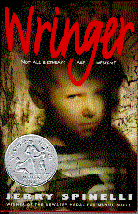 |
||||
| Chapters 1-14 | ||||
| punctured | cringed | harassed | contradiction | gangly |
| rollicking | meekest | careening | flailing | zombies |
| gravely | bluntly | debated | squeamish | diminishing |
| hoodlums | smugly | nuisance | strutted | barrage |
| disdainful | taunt | befuddled | sly | dreaded |
| Chapters 15-28 | ||||
| pudgy | ambled | casually | coaxed | gizzard |
| groggy | primitive | recoiled | flotsam | technicolor |
| daggery | hoisting | carcass | expel | buckshot |
| prim | oblivious | reluctant | ||
|
1. "This thing, this not wanting to be a wringer, did it ever knock him from his bike? Untie his sneaker lace? Call him a name? Stand up and fight?" (page 4). Although there is no physical reason why Palmer should refuse to become a wringer, and even though most ten-year-olds in his town consider it an honor, he abhors this tradition. Identify and discuss the reasons why Palmer does not want to be a wringer. 2. Jerry Spinelli uses powerful descriptive images to evoke the scenes of Pigeon Day, everything from the bright red barbecue sauce on a spectator's lips to the smell of gun-smoke. What does this recurring image of gun-smoke tell us about Palmer's anxiety? What are some other memorable images in the novel and what do they signify? 3. Do you believe Palmer's father when he tells Palmer "you can thank a pigeon for the swings at the playground" (page 57). Is Pigeon Day and the shooting of 5,000 birds a justified event simply because proceeds go to pay for the park's maintenance? Can you name any other events where animals are injured or killed for sport and entertainment? Do you feel these events are justified? 4. Consider Palmer's relationship with Beans, Mutto, and Henry. How does his relationship with them change over the course of the novel? In what ways is Henry different from the rest of the gang? Why does Palmer fear becoming more like Henry? 5. Dorothy claims that Palmer is a hero in his attempt to save Nipper from the guys and Panther the cat. Discuss the term heroism. What qualities make a hero? Do you feel Palmer is a hero? Palmer's father? Dorothy? 6. Why does Palmer feel compelled to ignore Dorothy or tease her in public when privately he holds much respect for her? Can you find any similarities between Palmer's friendship with Dorothy and his friendship with Nipper? 7. Describe how Palmer must feel when he discovers that his father was a champion pigeon sharpshooter. Does this discovery present a new pressure on him to become a wringer? 8. Palmer eventually defies the gang by shouting: "No nothing! No Treatment! No wringer! No Snots! My name is Palmer!" (p. 179) By refusing to take the abusive Treatment, refusing to be a wringer, and finally, by reclaiming his own name--the name the guys used to pick on--what has Palmer proved? How has he broken away from the group? 9. Compare the different ways in which Palmer and Beans treat animals. Do you think that Beans respects animals? How about Palmer? 10. Why does Palmer risk his reputation to befriend and care for Nipper? Discuss this question in the context of the following passage: "He thought of the pigeon flying over the snow-covered land, and he felt bad. . . . He thought about somebody else feeding the pigeon, and he felt jealous. Then he felt nervous, realizing he was thinking of it as his pigeon, and what a dangerous thought that could be around here" (page 79). 11. How does violence play a role in this story? Can you explain why anyone who receives Farquar's abusive and infamous "Treatment" garners so much respect from the community and why the shooting of pigeons marks a time for celebration? What do you feel Spinelli is trying to show his readers about the nature of violence in society? |
